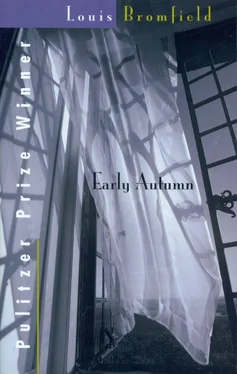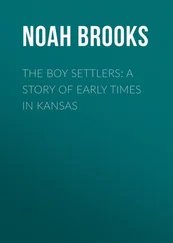And the service began again, read this time by the rector, who since the departure of the Bishop seemed to have grown a foot in stature. …
“I am the Resurrection and the Life, saith the Lord. …
“For a thousand years in Thy sight are but as yesterday, when it is past, and as a watch in the night. …
“0 teach us to number our days that we may apply our hearts unto wisdom.”
Aunt Cassie wept again, though the performance was less good than on the day before, but Olivia and John Pentland stood in silence while Horace Pentland was buried at last in the midst of that little colony of grim and respectable dead.
Sabine was there, too, standing at a little distance, as if she had a contempt for all funerals. She had known Horace Pentland in life and she had gone to see him in his long exile whenever her wanderings led her to the south of France, less from affection than because it irritated the others in the family. (He must have been happier in that warm, rich country than he could ever have been in this cold, stony land.) But she had come today less for sentimental reasons than because it gave her the opportunity of a triumph over Aunt Cassie. She could watch Aunt Cassie out of her cold green eyes while they all stood about to bury the family skeleton. Sabine, who had not been to a funeral in the twenty-five years since her father’s death, had climbed the stony hill to the Durham town burial ground twice in as many days. …
The rector was speaking again. …
“The Grace of our Lord Jesus Christ and the Love of God and the Fellowship of the Holy Ghost be with us all evermore. Amen.”
The little group turned away in silence, and in silence disappeared over the rim of the hill down the steep path. The secret burial was finished and Horace Pentland was left alone with the Polish grave diggers, come home at last.
3
The peace which had taken possession of Olivia as she sat alone by the side of her dead son, returned to her slowly with the passing of the excitement over the funeral. Indeed, she was for once thankful for the listless, futile enchantment which invested the quiet old world. It soothed her at a moment when, all interest having departed from life, she wanted merely to be left in peace. She came to see for a certainty that there was no tragedy in her son’s death; the only tragedy had been that he had ever lived at all such a baffled, painful, hopeless existence. And now, after so many years of anxiety, there was peace and a relaxation that seemed strange and in a way delicious … moments when, lying in the chaise lounge by the window overlooking the marshes, she was enveloped by deep and healing solitude. Even the visits of Aunt Cassie, who would have forced her way into Olivia’s room in the interests of “duty,” made only a vague, dreamlike impression. The old lady became more and more a droning, busy insect, the sound of whose buzzing grew daily more distant and vague, like the sound of a fly against a windowpane heard through veils of sleep.
From her window she sometimes had a distant view of the old man, riding alone now, in the trap across the fields behind the old white horse, and sometimes she caught a glimpse of his lean figure riding the savage red mare along the lanes. He no longer went alone with the mare; he had yielded to Higgins’ insistent warnings of her bad temper and permitted the groom to go with him, always at his side or a little behind to guard him, riding a polo pony with an ease and grace which made horse and man seem a single creature… a kind of centaur. On a horse the ugliness of the robust, animal little man seemed to flow away. It was as if he had been born thus, on a horse, and was awkward and ill at ease with his feet on the earth.
And Olivia knew the thought that was always in the mind of her father-in-law as he rode across the stony, barren fields. He was thinking all the while that all this land, all this fortune, even Aunt Cassie’s carefully tended pile, would one day belong to a family of some other name, perhaps a name which he had never even heard.
There were no more Pentlands. Sybil and her husband would be rich, enormously so, with the Pentland money and Olivia’s money … but there would never be any more Pentlands. It had all come to an end in this … futility and oblivion. In another hundred years the name would exist, if it existed at all, only as a memory, embalmed within the pages of Anson’s book.
The new melancholy which settled over the house came in the end even to touch the spirit of Sybil, so young and so eager for experience, like a noxious mildew. Olivia noticed it first in a certain shadowy listlessness that seemed to touch every action of the girl, and then in an occasional faint sigh of weariness, and in the visits the girl paid her in her room, and in the way she gave up willingly evenings at Brook Cottage to stay at home with her mother. She saw that Sybil, who had always been so eager, was touched by the sense of futility which she (Olivia) had battled for so long. And Sybil, Sybil of them all, alone possessed the chance of being saved.
She thought, “I must not come to lean on her. I must not be the sort of mother who spoils the life of her child.”
And when John Pentland came to sit listlessly by her side, sometimes in silence, sometimes making empty speeches that meant nothing in an effort to cover his despair, she saw that he, too, had come to her for the strength which she alone could give him. Even old Mrs. Soames had failed him, for she lay ill again and able to see him only for a few minutes each day. (It was Sabine’s opinion, uttered during one of her morning visits, that these strange sudden illnesses came from overdoses of drugs.)
So she came to see that she was being a coward to abandon the struggle now, and she rose one morning almost at dawn to put on her riding clothes and set out with Sybil across the wet meadows to meet O’Hara. She returned with something of her pallor gone and a manner almost of gaiety, her spirit heightened by the air, the contact with O’Hara and the sense of having taken up the struggle once more.
Sabine, always watchful, noticed the difference and put it down to the presence of O’Hara alone, and in this she was not far wrong, for set down there in Durham, he affected Olivia powerfully as one who had no past but future. With him she could talk of things which lay ahead—of his plans for the farm he had bought, of Sybil’s future, of his own reckless, irresistible career.
O’Hara himself had come to a dangerous state of mind. He was one of those men who seek fame and success less for the actual rewards than for the satisfaction of the struggle, the fierce pleasure of winning with all the chances against one. He had won successes already. He had his house, his horses, his motorcar, his well-tailored clothes, and he knew the value of these things, not only in the world of Durham, but in the slums and along the wharves of Boston. He had no illusions about the imperfect workings of democracy. He knew (perhaps because, having begun at the very bottom, he had fought his way very near to the top) that the poor man expects a politician to be something of a splendorous affair, especially when he has begun his career as a very common and ordinary sort of poor man. O’Hara was not playing his game foolishly or recklessly. When he visited the slums or sat in at political meetings, he was a sort of universal common man, a brother to all. When he addressed a large meeting or presided at an assembly, he arrived in a glittering motorcar and appeared in the elegant clothes suitable to a representative of the government, of power; and so he reflected credit on those men who had played with him as boys along India Wharf and satisfied the universal hunger in man for something more splendorous than the machinery of a perfect democracy.
Читать дальше












